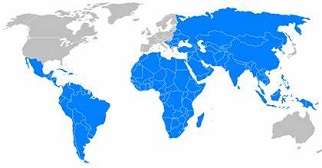For the first time at the annual climate summit, international organizations are set to spotlight policy options for developing countries to capture emerging trade opportunities while adapting to climate change at the upcoming UN climate summit COP28 in Dubai, the United Arab Emirates
The UN trade and development agency, UNCTAD, in partnership with the International Chamber of Commerce, the International Trade Centre and the World Trade Organization, will jointly host the “Trade House pavilion” at the 28th UN climate change conference (COP28) to spark discussions and advance consensus on trade-related measures that can help drive both climate and sustainable development actions.
COP28 is slated for 30 November to 12 December in Dubai, United Arab Emirates, and the pavilion will bring trade and climate policymakers and experts together for the first time in a UN climate conference.
UNCTAD will also contribute to the COP28 Trade Day on 4 December, the first time the climate summit will dedicate an entire day to discussions on trade’s role in climate action.
“Climate and trade policies need to work together. As the world is coping with the devastating effects of global warming, it’s time for trade to play its role in shaping climate action that fosters inclusive and sustainable development,” UNCTAD Secretary-General Rebeca Grynspan said.
“This starts with the international organizations with a trade mandate joining forces, and UNCTAD is pleased to work with our partners to host this first Trade House pavilion at COP28,” she added.
A platform for solutions
The pavilion will showcase how trade-led development can bolster climate action using coordinated and inclusive approaches to accelerate a global just transition to a low-carbon economy. It will also offer a platform for knowledge exchange and co-creation of pro-development solutions among stakeholders from across the globe.
It will comprise expert panel discussions on topics such as ensuring a just energy transition from a development perspective, South-South trade in environmentally preferable goods and services, and trade-related measures to advance the implementation of nationally determined contributions.
Panelists will also discuss services that support the energy transition, the role of plastic substitutes, sustainable investment, finance and the blue economy in supporting the just transition, among others.
Strong link between trade and climate change
The link between trade and climate change has never been clearer. Trade-related emissions, those associated with the global production and distribution of goods and services, contribute to roughly a quarter of all carbon dioxide emissions. Therefore, more cooperation is needed to reduce trade-related emissions to meet the goals of the Paris Agreement on climate.
Trade can also be a powerful tool to accelerate the energy transition and support resilient development pathways with low emissions. It can facilitate access to environmentally preferable goods and services and to technologies and know-how critical to boosting innovation and building capabilities to support mitigation and adaptation efforts in all countries.
At the same time, climate-related measures, such as industrial policies, carbon pricing and related border adjustments, are increasingly affecting trade and investment, with serious potential development impact.
The world needs a better understanding of the co-benefits and trade-offs between climate and trade policies and their sustainable development implications to ensure coherence in policy design and a just transition.
Challenges facing developing countries
Developing countries face challenges in mitigation, adaptation and transitioning to low-carbon economies. These include financial and fiscal constraints, inadequate infrastructure and institutions, and limited access to necessary technologies, skills, knowledge and capabilities.
A just transition must offer development opportunities, including technological advancement to spur structural economic transformation, job creation, enhanced productive capacity and trade diversification.
“A just transition requires coherent pro-development climate and trade measures, partnerships and policies. We must work together to explore innovative solutions that leverage trade as a force for good,” said Chantal Line Carpentier, head of UNCTAD’s trade, environment, climate change and sustainable development branch.
“UNCTAD is committed to partnering with all relevant stakeholders to co-create policy options and trade systems that allow developing countries to capture emerging trade opportunities while adapting to climate change and advancing their structural transformation,” she added and invited all to the COP28 Trade House.

